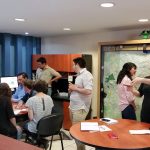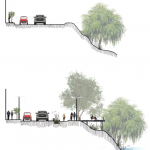In April 2016, 13 UBC students from Planning, Engineering and Landscape Architecture travelled to Morelia, Mexico to work with the Institute for Municipal Planning of Morelia (IMPLAN) and Centre for Research on Environmental Geography (CIGA-UNAM) of the National Autonomous University of Mexico on an urban river restoration project. The collaboration was part of the field course PLAN 545: Mexico Field Studio, led by the School of Community and Regional Planning (SCARP). The course aimed to provide students with an opportunity to apply their skills and knowledge to a real-world planning problem, and received financial support from UBC’s International Service Learning program.
Prior to departure, the students met weekly to learn about urban river restoration. The partner agency IMPLAN – Morelia’s recently-launched planning agency – provided students with the challenge: the restoration of the ecological conditions and public space along the urban river corridor that traverses the city of Morelia, the río Chiquito. Once in Mexico, IMPLAN worked closely with students for three weeks to ensure that the overlapping planning dimensions were considered, and that the resulting project was relevant to the city’s stakeholders. The CIGA provided academic expertise specific to the social and environmental context, as well as local contacts and workspace. A critical component to the project’s development was CIGA’s local students, who integrated with the UBC team and provided not just specialized local knowledge, but also the perspective of the quotidian, lived experience.
The combined team had two days of lectures learning from local experts about the river’s social, political, historical, and environmental context. Students also had the opportunity to walk along the banks of the river with local experts, who pointed out historical changes and signs of river degradation. To ensure an interdisciplinary analysis, students were organized by thematic groups (urban river, public space, urban design, and strategy) and segment groups, which analyzed a particular river segment in greater detail. The interdisciplinary groups mapped the river’s challenges in a site analysis, analyzed existing data sources, and grounded their observations by engaging with locals along the river. Based on the resulting analysis and existing public participation efforts, the students identified eight overarching strategies:
- Mobility and Transportation
- Green Corridor
- Mixed and Alternative Use
- Pedestrian Permeability
- Citizen Stewardship and Leadership
- Ecological Restoration
- Flood Risk Reduction
- Health and Wellbeing
The final document proposes twenty initiatives, ordered from Essential – such as the removal of wastewater from río Chiquito; to the Long Term – such as a river bank design that would allow the public to interact with the river and touch its waters. The final report, was presented to public officials and relevant stakeholders in the city of Morelia, including the Directors of IMPLAN, the Director of CIGA-UNAM, and a city council member of the city of Morelia, among others.
This project aimed to develop a lasting relationship with the partnering institutions. Furthermore, instead of providing ready-made solutions to be implemented as presented, the report serves as a starting point for an extensive and participatory consultation to be led by IMPLAN. In response to IMPLAN’s interest in participatory planning methods, the report included a public participation toolkit, that outlines a variety of tools and methods that might be used to engage with the public on any proposals to change the existing conditions of the río Chiquito.
The final bi-lingual report can be found on UBC’s Circle. A press note made by the IMPLAN can be found here.
- Combined UBC-CIGA team getting feedback from IMPLAN, at IMPLAN’s office
- Existing conditions, and proposed lane conversion and boardwalk

